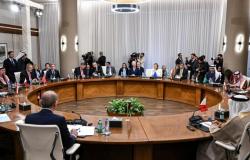The Prime Minister in charge of the transition in Syria, Mohammad al-Bashir, immediately appointed, promised calm and stability to the Syrians on Tuesday, two days after the fall of Bashar al-Assad’s power during a dazzling offensive by a coalition of rebels.
After the flight of Bashar al-Assad to Russia and the entry of rebels into Damascus on Sunday, life has returned to normal in the Syrian capital where businesses have reopened. But for many Syrians, the priority remains the search for missing loved ones caught up in decades of fierce repression by the Assad clan.
Along the same lines, Abu Mohammad al-Jolani, the leader of the radical Islamist group Hayat Tahrir al-Sham (HTS) at the head of the rebel coalition in Syria, told Sky News from Damascus that “people are exhausted by the country is not ready for another, and will not find itself in another (war).”
He also called on Syrians abroad to return home to allow the country “to prosper”, in an interview published Wednesday in the Italian daily Corriere della Sera.
“Preserve stability”
Mohammad al-Bashir chaired a meeting bringing together the new ministers and those of the deposed power. “The mission of the interim government is to preserve the stability of institutions and avoid the disintegration of the state,” he said. Mohammad al-Bashir Bashir was tasked with leading the transitional government until March 1.
>> Also listen to the report in Damascus by Céline Martelet and Noé Pignède:
Born in 1983, the Prime Minister has in recent years led the administration of the rebels in Idlib, their stronghold in the northwest of the country. In this city, the rebels have set up a sort of Islamo-conservative laboratory, eager to operate public services and demonstrate their aptitude for governance. Idlib presents a far-flung picture of the terror exercised by the fallen caliphate of the Islamic State. But the religious framework is strict: Christian worship is authorized but the crosses on the churches have been removed.
Mohammad al-Bashir, however, assured Wednesday that the rights of all faiths will be guaranteed in the country.
Former Syrian branch of Al-Qaeda, HTS claims to have broken with jihadism, while Western countries, including the United States, classify it as a terrorist.
>> Forum explanations:
Cautious optimism
Cautiously, the international community has noted rather positive signs towards minorities and an absence so far of large-scale reprisals against the supporters of the overthrown dictator.
Before the appointment of Mohammad al-Bashir, the UN envoy for Syria, Geir Pedersen, indicated that he was in contact with HTS, stressing that this organization and other armed groups “sent a positive message to the Syrian people” .
“The most important test” will be the implementation of the transition, he nevertheless stressed.
The head of European diplomacy, Kaja Kallas, spoke of “enormous challenges” ahead, hoping that Syria does not repeat the “terrifying scenarios” of Iraq, Libya and Afghanistan.
The head of American diplomacy, Antony Blinken, for his part declared that the United States “will recognize and fully support a future Syrian government resulting from an inclusive (political) process”.
Hundreds of Israeli strikes
Since the fall of Bashar al-Assad, Israel’s enemy, Israeli Prime Minister Benjamin Netanyahu affirmed that his country “will not allow any hostile force to establish itself on its border.”
>> Read also: The end of the Assad regime reshuffles the cards of power in the Middle East
The Israeli army said it carried out hundreds of strikes in several towns in neighboring Syria in 48 hours against strategic military sites “to prevent them from falling into the hands of terrorist elements”. Israeli leaders appear to fear chaos is brewing in Syria and are acting accordingly, experts say.
Israeli Defense Minister Israel Katz ordered the army to establish “a zone free of weapons and terrorist threats in southern Syria.” Earlier, Israeli troops took up positions “in the buffer zone” on the edge of the part of the Syrian Golan occupied by Israel.
According to a UN official in New York, who asked not to be named, Israeli forces occupy seven positions in the buffer zone.
hkr with ats



